CLICK ON THE BANNER ABOVE TO GO TO THE ROUNDTABLE SUPERSOAKER!
Something’s Got To Give……! When the emotions and longings of a man are pent-up in the body of a child!
Since there aren’t a ton of Little People movies, my options were limited. I didn’t want a movie with just a midget or dwarf side character. Andrew’s legendary previous review of For Height Only basically sewed that film up. The Teleport City guys put dibs on that El Santo and Blue Demon movie where they fight an army of supermen dwarves. And the most famous title in Little People cinema, Terror of Tiny Town, is basically a one joke affair, a standard oater with an all little people cast.
Eventually I set my sites on finding a copy of Seven Dwarfs to the Rescue, an old Italian kid’s film and unofficial sequel to the Snow White story. I eventually found a website called Atlas DVD which sold a copy, and at a bargain basement price of five bucks! Moreover, the guy who runs it is Roger Craig, the author of several b-movie books for McFarland Press, including a tome on Larry Buchanan. So as a bonus I had a nice running conversation with him.
While looking through Atlas’ listings, meanwhile, I found they also carried a film I’d never heard of. It was a midget movie called It’s a Small World, and more than that, it was directed by William Castle! Needless to say, I ordered that one too. And in the end, that was the one I decided to focus on.
Although I since found out that Warners has released a remastered print of this film as part of their VOD DVD-R service, I doubt I’d have wanted to spring 20 bucks or more just for a better copy of the film. (The stills accompanying this review are from that source, however. I swiped them off the Interwebs.) For what it’s worth, if you want decently watchable if not pristine copies of some really obscure movies for only five bucks a pop, I can heartily recommend Roger’s wares. He has a particularly impressive range of ‘70s TV movies and Mexican kiddie flick titles.
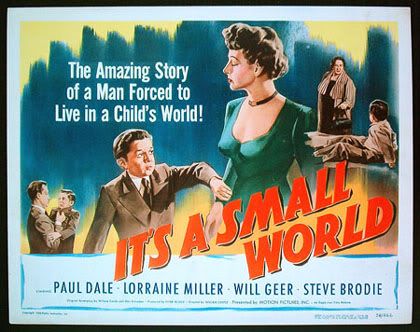
FOREWORD
This is the story of a special
group of people. It concerns the
great difficulty they have in ad-
justing themselves to a normal world.
It is hoped that by better under-
standing the lives of these people
a greater and deeper knowledge of
all humanity will come to us.
I guess there’s a jump in my worn review copy of this film, because the next card seems to be missing. I assume it said something like: “Also, we hope to make a few bucks off a movie about midgets. By the way, did you ‘get’ the title? Do you see what we did there? Huh? ‘Small World’? We originally were going to call it, ‘Hey, Look, A Midget!,’ but we thought that might be a little on the nose. Ha! “Little’ on the nose! It’s funny even when I’m not trying.”
To the blare of a trumpet (!), we open our film proper. Literally, as the first shot involves turning the pages of a large book laid before the camera. We settle upon an illustration of a generic lad, the page inscribed “PART 1 The Boy”. We meet our young protagonist, one Harry Musk. As this film will document, for reasons beyond his control he will be subjected his entire life to the mocking laughter and unthinking scorn of others. But enough about his name, he’s also be a midget.
We next get a needlessly ornate (and presumably expensive) crane shot as the camera descends from on high towards a school yard. As jolly music plays on the soundtrack, we see the scrappy but already short young Harry getting the tar beaten out of him by a gang of neatly dressed, buzz-cutted schoolyard bullies. “That will teach you,” the central Opie-esque ruffian sneers. “Who are you trying to kid by saying you’re twelve?”
Harry staggers off, tears in his eyes, still accompanied by merry music. Presumably this is meant to pose an ironic counterpoint, although it sure doesn’t seem like it. Meanwhile, the soundtrack offers up other ambient putdowns, such as “Go back where you belong!” (Midgetland?) and “We don’t want no shrimps on our team!”
Harry grabs up his books and ambles home, where we see that his family lives on a really obvious set. There his widower father is sitting at the kitchen table, scanning the paper. Finally the music has assumed a properly melancholic tone. Spying his son’s rumpled appearance; he tosses an arm over the lad’s shoulder and observes, “I suppose the boys at the school licked you again.” Luckily, no; they just beat him up.
Dad goes on to inquire, “Why don’t you fight back for once?” Oh, cruel, cruel world. He’s got a point, though. If Harry had any gumption, he’d train a mischief of rats to do his bidding and set them upon his enemies. I’ve seen several movies like that.
Harry slinks off, just as his eight year-old sister Susan enters. To Harry’s presumed dismay, we see that Susan is already taller than he is. She’s arrived to report that the fracas wasn’t Harry’s fault, that the other kids just pick on him because of his height. “I can’t figure it out,” Dad sighs. “I’ve beat him and I’ve pampered him and he just stays nothin’.” Yep, those are all the treatments recommended by Modern Science, all right. No wonder Dad is at his wit’s end.
Just to make sure that Harry doesn’t try to fob off responsibility for his dilemma, Dad drags him over to the wall to stand him up against what is clearly a much-scribed chalk mark on the doorframe. This provides damning proof that the recalcitrant lad hasn’t grown at all in all time. When’s that kid going to get with the program?
Dad takes young Harry to the family doctor. However, since he’s already tried beating and pampering, there’s not much more to be done. “I’m just a country doctor,” ol’ Doc explains. Not to mention a frozen caveman lawyer and hyperchicken. “People call me for bellyaches and chopped off fingers.” (The Number 7 Combo, as the locals call it.) “All I can say,” he elucidates, “is your boy will grow no bigger than he is right now.” He can only offer Dad a weirdly thick book “that will help you understand it.” I’m not quite sure why it would take 900 pages to say, ‘He’s a midget.’ Perhaps it was written by Herman Melville.
I think we get the idea, but since we’ve 68 minute to kill (the IMDB time of 74 minutes is wrong), we see various townsfolk, such as two little jump-roping girls, gossip about Harry’s plight. Then some other little girls start mocking Susan on Harry’s behalf. Rousseau was right; nobility is clearly the natural state of Man. On the other hand, it’s hard to feel sorry for the goldbricking Susan. She should get off her ass, develop vast telepathic powers and unleash them upon her tormentors. I’ve seen several movies like that.
To get the audience on up to speed on the exotic idea of “a midget,” we cut to Harry reading a descriptive chapter—well, paragraph—from the doctor’s tome. It’s a bit churlish to say, but this informational moment isn’t helped by Harry reciting the dry scientific text in his high, squeaky midget voice. There’s a reason they didn’t get Betty Boop to do the audio book of All Quiet On the Western Front. Moreover, there’s a sad lack of anyone responding to the word ‘midget’ by asking, “If that’s the word you Men of Science use.”
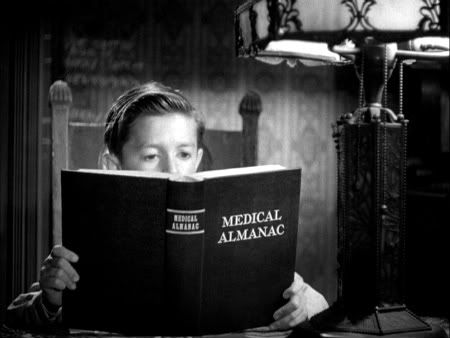
At his wit’s end—which, not to be mean, doesn’t seem that great a distance—Dad goes to Harry’s teacher and informs her that he’s pulling his boy out school. She responds that the lad is one of her best students, but he insists. He grabs Harry’s school books and supplies and takes his leave.
Harry is less than pleased to hear the news himself. Presumably he suspects that the idea is born as much of Dad’s embarrassment over Harry as it is concern for his safety. “People, they don’t understand, they’d only laugh at you,” Pop explains. “Better that nobody sees you, son.” Well, then, just have him stand behind the sofa. Dismayed, Harry leaves the room.
Say what you will about Castle, but he did try a flourish now and again. That night a restless Harry is tormented by his id, which manifests itself as his own disembodied shadow cast up upon his bedroom wall. Well, either that, or it really is his shadow, and the movie’s taking a much more interesting turn.
Again, though, the serious tone of the scene is somewhat diffused by the Shadow having Harry’s squeaky, Mickey Mouse voice. I realize I’m doing exactly what the film is railing against, but it’s hard not to let it undercut the drama. “That’s great!” his Shadow snarks sarcastically. “Does that mean your shadow won’t grow anymore, either? You gotta grow, I won’t stay small…Why can’t you be like Joe? Look at him! Football, baseball, basketball. What do you do? Sit and look.” The good news is, if Harry follows that regimen, he’ll at least grow fat. So, you know, bigger shadow.
To counterpoint the doom and gloom, and showing a realistic sense of ‘life goes on,’ we next see Harry and his Dad out in the fields. (I guess Pop is a farmer.) Spending time together seems to have drawn the two closer, as indicated by some rather exaggeratedly swelling music. Plus, when they examine the rabbit hutches, Harry gets to see what are proportionally the biggest rabbits this side of The Night of the Lepus.
Next we see a curious little girl, Janie, come to check Harry out. When they meet at his backyard gate, she inquires, “It’s not catching, is it?” She means being a midget, of course. Reassured that it isn’t, she grabs Harry’s hand and they go over to play with his puppy. I have to wonder how old Janie. She’s a bit shorter than Harry, for instance. Still, I guess he’d take any companion he could get, and Jennie does seem like a sweet kid.*
[*According to the end credits, Janie is supposed to be eight at this point.]Cut to some chicks. Sadly, this doesn’t herald an appearance by Foghorn Leghorn and Dog. After a montage of similarly young animals, and then older versions of the same, we cut back to Harry. The passage of several years is succinctly indicated by the fact that his dog is now a fully grown Collie. They also indicate Harry’s adulthood by having him clad in a suit and tie.
Further evidence is provided by a return visit from Janie, now a fully grown woman at 16. (Maybe she’s fully grown because the actress playing her now is a good ten years older than that.) The two are clearly remained very close, even to the point of still holding hands as they cross the yard. It turns out they read together. Small town life, I guess. Today Janie reads aloud from Gulliver’s Travels. Get it? About two paragraphs in, Harry falls asleep. Janie smiles, so I can only suppose she slipped him a roofie or something so she could get out of there.
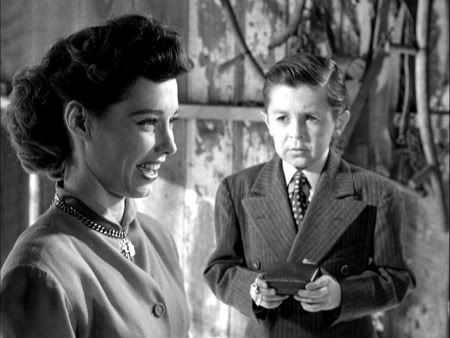
Worst instance of “Dick in a Box” ever.
Things aren’t always so rosy for Harry, however. Back home, his 16 year-old sister Susan returns home from school. As Harry washes dishes near the door, he can hear her frantically dissuading her friends from coming inside. Now a typically self-involved teen, it’s clear that Susan’s days defending Harry are behind her. Quite the opposite, in fact, as she lays into Harry as soon as she’s shut the door behind her.
We cut again to Harry and Janie. She’s giving him a belated birthday present; an inscribed watch. Then she playfully revisits the “It’s not catching, is it?” line, laughing when Harry doesn’t immediately catch on. However, this reference to their first moment of friendship proves to be a precursor of further bad tidings for our diminutive protagonist.
Janie happily informs Harry that she’s gotten engaged and will be moving away with her new husband. At this point I really have to question whether Janie was indeed meant to be only 16 at this point. I know people got married younger back in those days, especially small town girls. Still, Janie’s being 18 at this point would make a bit more sense, and at least slightly mitigate the actress’ apparent age.
In any case, Harry’s face crumbles at the news. It’s almost immaterial whether he has romantic feelings for her, although like many lonely men who have a woman friend, he probably has at least some mixed in there. The fact is that the younger but now fully-grown Janie is moving on to a world of normalcy that Harry can never really know. More directly, she takes with her the only uncomplicated, completely happy relationship he has known.
This scene, although a bit schmaltzy, brought home the nature of Harry’s situation, and I realized with dismay that the film wasn’t going to be the schlockfest I’d been hoping for. I mean, I knew it wouldn’t be as crazy as Glen or Glenda?, because Castle is no Ed Wood. Who is? However, given the gonzo nature of Castle’s famous horror movies, I was hoping for something closer to Chained For Life, the picture where one Siamese twin sister (the film stars actual Siamese twins) kills a guy and the law has to decide how to imprison her when it means jailing her innocent twin as well. Hopefully later Harry will save a bunch of orphans by crawling through a doggie door or something.
Things become increasingly untenable at home after that. Susan, for instance, starts openly decrying how she can’t have a boyfriend because of Harry’s presence. As with her friends, she’s too embarrassed to ask any of her beaus in after a date. Frankly, she’s probably overestimating the effect Harry would have on these young men. Surely they know of him; this is too small a community for his existence to be forgotten. However, years of hiding Harry away have undoubtedly taught Susan that he really is something shameful.
On the other hand, Harry himself clearly feels increasingly stifled by his enforced segregation on the family farm. It’s been indicated that he doesn’t even go to town, lest he provoke sneers and mockery. And he’s really too physically small to do much around the farm, meaning that he basically just sits around the house all day. (Believe it or not, there was a time when this was considered weird.)
Now 21 years of age, he presumably has been thinking of striking out on his own in any case, getting out into the wider world where he can find a place for himself. Plus, you know, there really isn’t anywhere else for the film to go if Harry stays here. All this material has basically been mined out.
Since the family isn’t exactly rolling in cash, Harry sends a letter to Jackson, a small time carnival owner. Jackson soon arrives and proves entirely pleased with Harry’s money-making possibilities. From the start we can tell the whole thing is a bad idea. Jackson tries to project an exaggeratedly jovial bonhomie, but it has a patently false smell to it. Moreover, Harry now has a barely-suppressed hatred of being gawked at, not exactly a promising start for a guy who has agreed to join a sideshow.
The two prepare to leave. Dad is genuinely sorry to see Harry go, and goes as far as to embrace him, which we can pretty much tell isn’t natural for him. He tells Harry to remember that he’s always got a home waiting for him here, and gives his son what cash he can spare. In a nice touch, meanwhile, Susan stands in the background a bit shamefaced. She apologizes to Harry for how she’s treated him, but doesn’t try to get him to stay, either. All it all, a pretty believable response.
Things quickly degrade from there. Even by the time they hit the road, it’s clear that things are not destined to end well. Jackson tries to jolly Harry into a more positive frame of mind — and really, it’s not like Jackson’s expectations are all that unreasonable — but Harry, clearly already regretting his decision, draws completely into himself. They are, sadly, an ill-matched pair. Harry needs time to assimilate the fact that everything he knows is now behind him. Jackson, for his part, is one of those guys who just can’t stop jabbering, nor let things lie.
Things reach a head at when they stop at a diner. Jackson immediately starts hawking his new acquisition to the other patrons. In response, an infuriated Harry pulls away every time Jackson tries to get him to do some shtick. In the end, Harry goes to the washroom and, in a clear panic (this is a guy who basically hasn’t interacted with but three people since he was twelve) climbs out the window and books it.
There follows pretty much exactly the sort of thing I’d been hoping for from a William Castle midget movie. Harry runs desperately through the nighttime countryside, seeking only a vague escape. No matter where he turns, however, he always sees Jackson’s braying face projected before him. This is true even when he enters some cornfields. I have to admit, my first thought (hope?) was that Harry would decide to camp out there permanently and end up becoming Malachi, the murderous leader of the Children of the Corn.
Sadly, it’s not to be.
I have to say, the film picks up quite a bit here. Even before he focused on horror movies, Castle made a lot of B thrillers. This sequence is right up his alley and pretty sharp, with nice location shooting that really stands out compared to the film’s cheapie sets. At the same time, the superimposed faces and melodramatic music are also a bit silly, so that’s classic Castle too. Superimposition was a favorite technique of Castle’s, seen in such features as 13 Ghosts and The Night Walker.
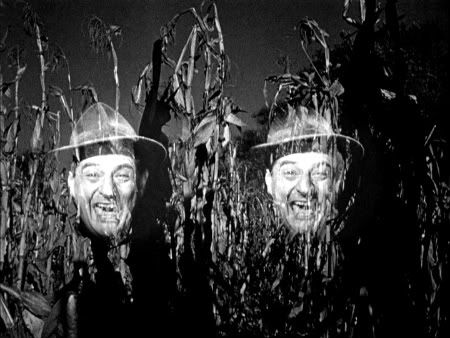
Harry is ‘stalked’ by…. Hey! That joke was funny the first three hundred times I used it! Everyone’s a critic. Anyway, this is an a-‘maize’-ing scene….
Eventually, Harry thumbs a ride from a truck driver who is, shall we say, rather strenuously Italian. This fellow assumes Harry is a young lad running away from home, and Harry does nothing to dissuade him of that notion.The guy is heading to the vegetable market in The Big City (I don’t think they say which one, but presumably it’s Los Angeles), and Harry comes along.
Here we move to the second part of our story, as the previously seen book is turned to an illustrated leave reading The Woman. In the drawing she’s standing under a streetlamp, so I guess we’re supposed to take our cue from that.
Harry gets out at the market and begins walking around, accompanied by jaunty music. This sequence again is highlighted by some fairly rare-for-the-time location shooting as Harry ambles through the city. This goes on for a while, but then, he isn’t moving very quickly because of those little legs.
Eventually he ends up on a park bench next to Sam. He looks longingly at the sandwich Sam is eating (cue blare of comical music) until the guy takes the hint and offers him half of it. Sam proves a rather fortuitously nice fellow, an ex-service man who plans to enjoy civilian life by living free and easy for a while. He currently makes his modest income as a shoeshine guy, and suggests that Harry take up the trade as well. Sam has an extra kit Harry can borrow, and they can work as partners.
It doesn’t take long to learn to shine shoes, and by the next morning the two are plying their trade in the park. Due to the novelty of getting one’s shoes shined by a midget, Harry soon has customers lined up while Sam can’t even give his services away. “It’s a good thing we’re partners and not competitors,” he ruefully grins.
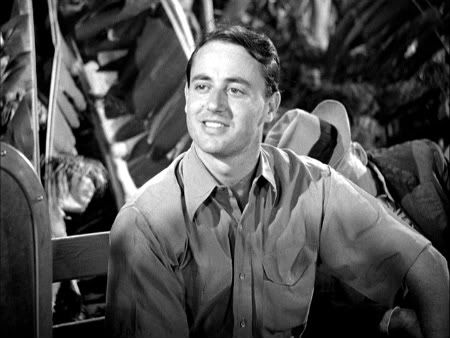
“Hey, did I ever mention the time I played Jimmy Stewart’s brother in It’s a Wonder…oh. I did? Huh. Anyway, this one time, Jimmy comes up to me and says, “You know, Todd, I’m not sure how to play this scene….”
Meanwhile, Harry procures a cheap room. Things are finally looking up for him…more than usually, I mean. Because, you know, he’s small and everything. However, trouble appears in the form of a dame. A neighboring tenant is getting smacked around by what is clearly meant to be a john, and Harry futilely attempts to pummel her assailant.
The guy splits, though, and the woman, called Buttons (!), joins Harry in his room and lets him minister to the shiner the guy gave her. She casts a predatory gaze upon him, presumably reading him as an easy mark. Unsurprisingly, Harry finds the attention of even a wilted flower like Buttons intoxicating. His gaze travels up her (to him) Olympian heights, from her have-sex-with-me shoes and up over her tight dress. She sure isn’t the kind of girl he knew down on the farm.
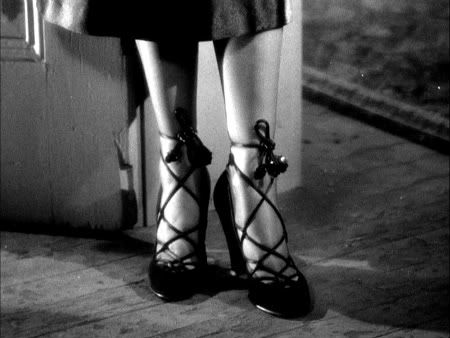
Fetish shoe shots…midgets…welcome to Twin Peaks, 1950.
Button’s vamping of Harry is nicely observed. Having been around, she knows how to punch guys’, well, buttons. She lets Harry tend to her eye, putting him in charge, a heady feeling he hasn’t experienced often, especially with women. When he climbs a chair to wash her eye, he bids her come over to him, and she acquiesces with a chuckles. Standing on the chair, he’s just taller than her, presumably given him a rare feeling of power. She plays into it, but you can see wheels turning in her head.
Here Castle’s taste for melodrama finally flowers, as the film becomes kind of a half-assed noir. Buttons keeps Harry on a string, introducing him to booze and such. (Although any ‘such’ is kept firmly implied and off-camera.) When she takes to a low-rent neighborhood bar, everyone naturally stares at Harry. “What’s the matter?” she japes. “Ain’t you ever seen a black guy before?” Everyone laughs and mostly leaves them alone.
Not wasting any time, Buttons introduced Harry to hard liquor. This is, presumably, the sort of thing Harry came to the Big City to experience, even if he didn’t know what it was. Meanwhile, she slyly works to leverage control over him. She more or less orders him not to go to work on Sunday (presumably a big shoe shining day), and instead they go out on a date of sorts, walking hand in hand down the city streets to see the local sights. Harry can’t believe his luck, and gladly shells out his hard-earned bucks.
Meanwhile, Buttons continues to soften him up regarding some (to us, anyway) clearly dubious plans she has for the little man. However, Harry quickly grows frustrated at the way Buttons (surprise) continues to keep company with other men. Don’t be a hypocrite, Harry. You shine a lot of dudes’ shoes; she shines a lot of dudes’…well, anyway.
When Buttons waltzes out with another ‘friend’ despite their supposedly having a date, an irate Harry looks across the street through his window. There we see a rather blatantly expressionistic shot of a drenched-in-shadows nightclub. Failing to be warned off by the all too apparent symbolism, Harry goes down there to drown his sorrows. As he spends the night in the sleazy juke joint, we can see that his fall into moral degradation is well along its way.
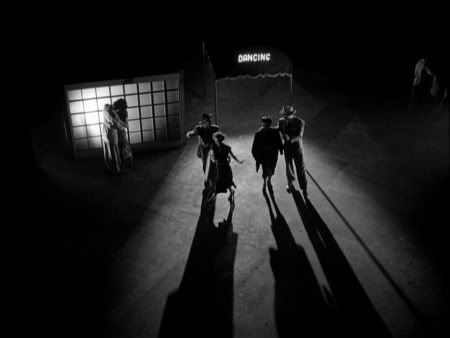
As he chugs down his beer (remember he still weights like 50 pounds or whatever), he sees, yes, superimposed visions of Buttons’ face floating before him. Sadly, he doesn’t then start seeing a giant bee. However, he does gaze with frustration at a couple sucking face in a nearby booth. In the end he gets epically plowed and makes a wee spectacle of himself. When a horrible woman starts to cluck over what a cute midget he is, he tosses his beer in her face.
The next morning, his anger at Buttons along with his hangover causes him to be surly to a puzzled Sam. As usual when in a bad mood, Harry becomes hostile and uncommunicative. When Sam presses him to tell him what’s wrong, Harry petulantly shoves off. He presumably wanders the city all that day. However, when he arrives back in his darkened room that night (and yes, it is intermittently lit by a nearby flashing neon sign, thank you very much), Buttons is waiting for him. Time to spring her trap.
She jollies him up and then hands him a card, telling him she has a “good job” for him. She tells him to go to the address the following night. He of course does so, and is met at a dingy apartment door by Rose, a hugely rotund woman. Harry laughs in astonishment at this mountain of a woman. She’s big enough that I thought she might be a professional fat lady and that Buttons was trying to hook him up with another side show, but it’s better than that.
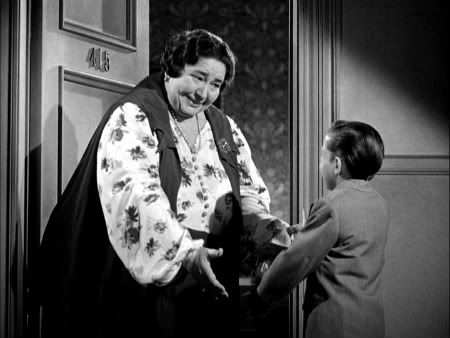
“Why, look at you! I could just eat you up! And I mean that literally!”
She leads him inside, and her constant laughter reminds us (if not poor Harry) of the glad-handing Jackson. Sadly, though, she proves to be the leader of a small band of street crooks. Their plan is to train Harry to be a pickpocket, dressing him up as a kid and sending him into crowds. Harry, meanwhile, is less than pleased to meet gang member Charlie (Steve Brodie!), who’s the sort of guy who instantly starts calling him Shorty. The idea is that Buttons and Charlie will stroll around like a couple, with Harry dressed as their kid to allay anyone’s suspicions.
Harry quickly figures out things aren’t on the up and up, but they cozen him into going along with their plans. Buttons, needless to say, is a big part of this. She plays up the resentment card, and when that doesn’t work, sends Rose and Charlie out of the room and turns on the charm. And, it must be said, it’s not like Harry is the brightest bulb in the, er, little cardboard box of bulbs. In the end, she talks him into it. I mean, where would the movie be if he just walked out? We’ve half an hour left here.
Rose trains Harry in the skills of his new profession. Naturally, he picks it up quite quickly. Soon the gang is out on the street. In a bit of a directorial blunder, we get a montage of shots of the four of them (gasp) superimposed over various crowds. The problem is that the film’s previous superimpositions always represented Harry’s perspective. Now they are from a god-like third person perspective. It’s not very artistically coherent.
Anyway, things go smashingly, and the gang quickly accumulates a ton of loot. However, Button’s attentions have predictably begun to wander now that she’s gotten what she wanted from Harry. After he catches her making out with the more conventionally manly Charlie (gee, who’d have thought?), he’s inspired to declare his hopes of marrying her. You can imagine her reaction, which is less than ego-building. Realizing what a fool he’s been, Harry wants out. However, when he tells Rose he’s leaving the gang, and moreover announces he’s going to the police, the formally jovial giantess puts her ham-hock mitts around his little neck, with obvious emphasis. Apparently two week notice won’t cut it.
Harry dutifully arrives for the planning of a Big Job (stealing a payroll!) the gang has lined up that evening. However, he calls the cops before he does so. Meanwhile, the gang is all fidgety and nervous, presumably because a heist is far past simple pickpocketing. When Charlie notices Harry keeps looking at the door, the gang smells a rat. Things are about to turn nasty when a couple of uniform cops—what, they couldn’t spare a Bunco Squad detective?—burst in and arrest everyone. Although you can barely see, one of the cops is Castle, doing a cameo. Amazingly, he resisted giving himself a close-up.
Harry, the loyal Sam at his side, is soon meeting with the Judge. Since Harry squealed on the gang, and seeing that Harry isn’t a hardened criminal, he chooses to remand Harry to someone else’s custody, and hands him a train ticket to Miami. Sam offers to join Harry, noting that he can shine shoes as well in Florida as here. However, Harry prefers a clean break, and the two pals say their goodbyes. And thus ends the second part of our story.
The Book opens to Part III: The Circus
Well, that’s not a very imaginative solution. Still, the guy was a Judge, not Solomon. Harry reports as ordered to the Florida winter camp of the real life and still extant Cole Bros. Circus. And while Harry is still contrite, he’s yet unprepared to be solely defined by his size. However, the manager Mr. Winters is a far cry from Jackson, being almost improbably soft-spoken and patient. He asks Harry to hang around a while and give the circus a looking over before making his decision. Harry reluctantly agrees.
Unsurprisingly, there follows long stretches of economical circus life footage. But hey, why not? What, are you going to have access to elephants and clowns and acrobats and pony acts and not shoot them? The moment that had me all a ’tingle was when we see Harry feeding a burro. I was hoping his act would be to replicate the scene in The Trial of Billy Jack where a kid with hooks for hands, clutching a rabbit, is shot down by marauding National Guard troops while attempting to protect his own pet donkey. Sadly, though, we get no indication that this is so.
As you’d expect, we see that the circus is a close-knit community, one where Harry can find a place for himself. Hell, they even have a black guy working there. I mean, sure, he’s a porter or something, but what are you going to do?
Cementing things is the presence of blonde midget Dolly, who does an animal training act. She and Harry inevitably grow closer, and eventually we see her give him a birthday present. It’s an inscribed watch, like the one Janie gave him earlier. It’s even got exactly the same inscription, “To My Best Friend.” See, while he had to give Buttons presents, good women give him stuff. Yo, bitch better have your money, dawg.
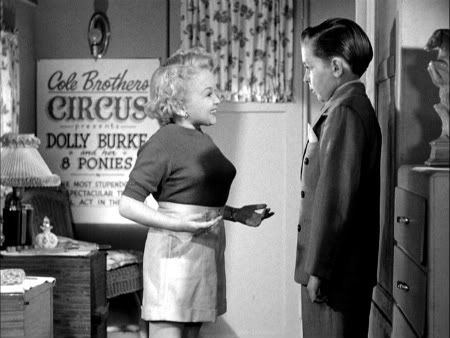
“Can you loan me a buck? I’m a little short today!” [Get it?]
Later Harry plays a record for Dolly, to which he’s made up lyrics. (These, naturally, were actually written by the guy who did the film’s score. Let’s just say that Johnny Mercer had little to worry about.) Unsurprisingly, the title of this tune is “It’s a Small World.” Harry croons away in his piping voice—Maurice Chevalier probably didn’t lose much sleep either—and let’s just say that Dolly looks rather more delighted than many in the audience probably were. Anyway, he ends the song, takes Dolly in his arms, and they kiss. At this point I was pretty sure I wasn’t destined to ever become a midget porn fan.
Sure enough, Harry and Dolly end up getting married (with Harry amusingly clad in a Grandpa Munster tux), and Our Hero has finally found himself accepted for who he is. It’s a rather conventional ending, but really, Castle wasn’t making an art film here.
Afterward
The film has a pretty odd cast. The star, Paul Dale, never acted again (his only other appearance was, unsurprisingly, in The Wizard of Oz eleven years earlier). Neither did the woman who played Dolly. The supporting cast, though!
Dad was played by Will Geer, a busy character actor who did the usual ton of movie and TV work. He gained a measure of immortality for playing the Grandfather on TV’s The Waltons.
The 16 year-old version of Harry’s sister Susan was played by Shirley Mills. Ms. Mills infamously starred in the 1938 hicksploitation flick Child Bride where, at the age of 12, she played a budding sexpot who earns the leers of several creepy hillbillies. The film is mostly remembered for Ms. Mill’s lengthy nude skinny dipping scene. Again, at the age of 12! Despite that, two years later she had a fairly major supporting role as one of the Joad clan in John Ford’s classic The Grapes of Wrath. Things never progressed much from there, however, and she apparently gave up on acting in 1956.
The actress who played the 8 year-old Janie was Lora Lee Michel. The year before, she similarly played the younger version of heroine Jill Young in the Harryhausen classic Mighty Joe Young. She never graduated beyond child roles, however.
The older Janie was assayed by Margaret Field. She’s one of several cast members with ‘50s genre credits, which isn’t surprising, given how sci-fi flicks were made that decade. (It’s sort of like how most young actors in the ‘80s appeared in slasher movies.) Field actually had some starring roles in The Man From Planet X (1951) and Captive Women (1952), in both cases starring opposite the Hideous Sun Demon himself, Robert Clarke. More famously, Field was the mother of Oscar winning actress Sally Field.
The unctuous Jackson was played by Thomas Browne Henry. Mr. Henry played more military men in ‘50s sci-fi than about anyone this side of Morris Ankrum. He appeared in such films as Earth vs. the Flying Saucer, The Beginning of the End, 20 Million Miles to Earth, the Jabootu favorite The Brain from Planet Arous, The Blood of Dracula and How to Make a Monster.
Harry’s buddy Sam was played by Todd Karnes, who is easily most famous as Harry Baily, Jimmy Stewart’s flyboy brother in Frank Capra’s It’s a Wonderful Life.
Nina Koshetz (Rose) was a classically trained and quite famous Russian opera singer. In her native country she hung out with the likes of Rachmaninoff, who composed a series of songs dedicated to her. Immigrating to the States in 1920, perhaps fleeing the post-revolution Communist regime, she became a much respected vocal coach. She also appeared in a handful of films, such as this one.
Finally, gang member Charlie was played by Steve Brodie. Brodie has a smallish part in the Harryhausen classic The Beast From 20,000 Fathoms, and later went on to star in primo crap like The Wild World of Batwoman, Jabootu fave Frankenstein Island and The Giant Spider Invasion.
No one would ever hear of the film’s obscure director, William Castle, again.

